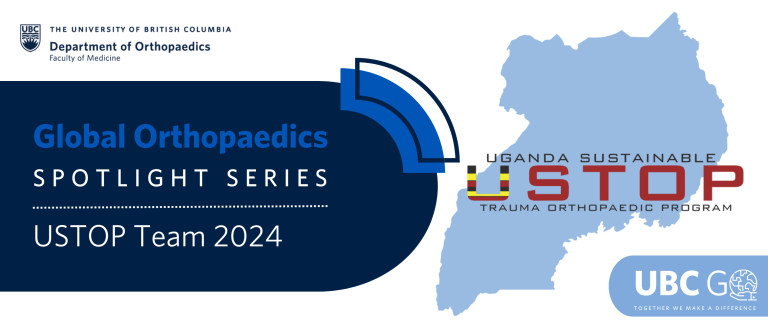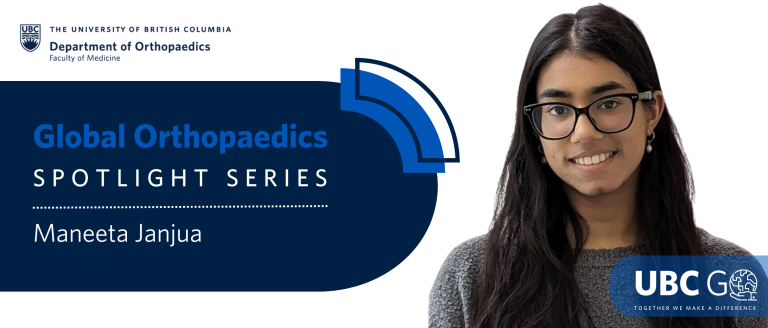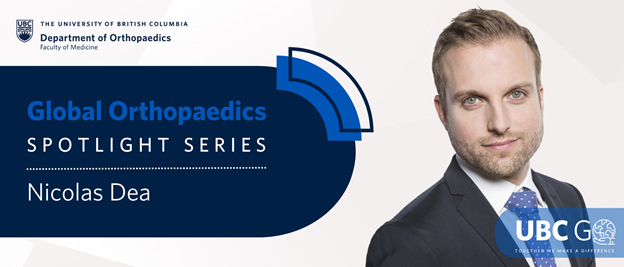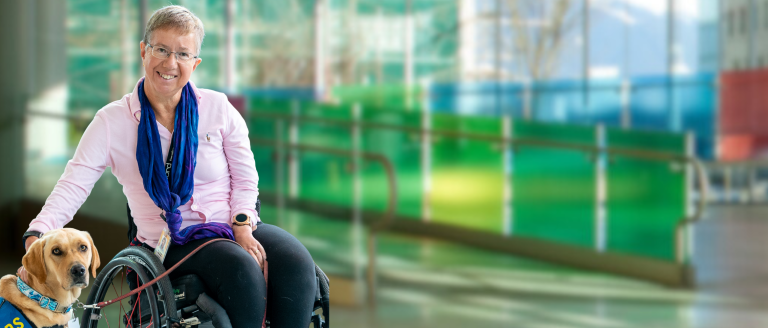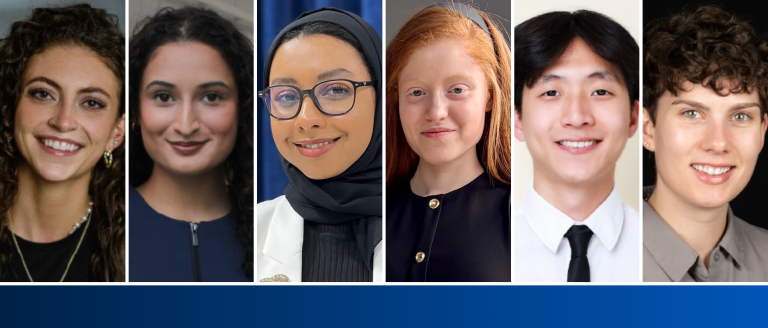By Tarini Boparai & Maneeta Janjua
Our UBC Global Orthopaedics (UBC GO) Spotlight series features in-depth conversations with a UBC Department of Orthopaedics member about their involvement in global orthopaedic initiatives.
In this next spotlight, we learn about UBC Clinical Professor and orthopaedic surgeon, Dr. Norgrove Penny. Dr. Penny, whose formative childhood experiences ignited his passion for a medical career, has dedicated himself to transforming orthopaedic care for thousands of individuals in Africa. In his unwavering commitment to making the world a better place, he has taken on challenges of all magnitudes. His journey has taken him on numerous short-term trips, into the heart of mission hospitals for locum assignments, as well as a path where he has established rehabilitation programs and developed a national healthcare plan.

NORGROVE PENNY
Project/Initiative:
Uganda Sustainable Clubfoot Project
Christian Blind Mission
What inspired your interest in global health/surgery/orthopaedics?
I have had a lifelong interest and involvement in Global Surgery. In many ways it was the motivation to go to medical school from the beginning. When I started my practice in Victoria in 1978, I put aside one month every year to volunteer somewhere; it was just dialed into my work life. I have always had a sort of dual interest within orthopaedic surgery, children, and sport. I had competed nationally in swimming in high school and University. So, my volunteer efforts tended to alternate between accompanying Canadian teams as a physician one year and heading off to Africa the next. My roots were in Africa. I lived my first 11 years in what was then Rhodesia, now Zimbabwe, with ancestry that went back 300 years in Africa. My father was a missionary doctor, South African trained, who always worked with the Indigenous people in South Africa, Rhodesia, and the Congo. During our time in Congo, I almost died of cerebral malaria. Dad never earned much income, we lived frugally, but very adventurously. I loved living in Africa. I grew up with the accepted ethic that being a doctor was a calling, not just a job, and that we are commissioned by God to make the world a better place and specifically to help the poor and those that are marginalized and in desperate need. So, my global work is simply part of my physical, philosophical, and spiritual DNA!
What did you do?
The 70s and 80s was a bleak time for Africa. With independence and the end of the colonial era, everything wound down and there ensued a lot of political corruption and economic mismanagement. The hospitals had no money and little real role for specialists like myself. My volunteer visits taught me the lay of the land and to understand the issues of poverty, lack of infrastructure, personnel, and training. I volunteered with Orthopaedics Overseas in Malawi, did several short-term trips to Zimbabwe and South Africa, and a locum assignment in a large mission hospital in Kenya which was influential.
Then in 1996 I was recruited by a faith-based NGO, Christian Blind Mission (CBM), to go with my family to Uganda full time. We lived there 6 years. CBM was one of the world’s largest and most experienced NGO’s dealing with preventable blindness, notably cataracts, in the developing world. On re-establishing their work in Uganda after the destructive legacy of Idi Amin they found vast numbers of children with orthopaedic disabilities, especially polio, and I was tasked with setting up an orthopaedic program. Starting with nothing, with 3 ex-patriate physiotherapy colleagues and a lot of local Ugandan expertise, we were able to develop an integrated surgical and rehabilitation program performing 1,000 operations annually which led eventually to the establishment of a purpose built children’s orthopaedic and rehabilitation hospital, CoRSU, now performing more than 5,000 reconstructive surgeries annually, with a fully indigenized surgical staff and an accredited paediatric orthopaedic fellowship training program. I learned so much strategic development from the ophthalmology expertise of CBM and considered them thirty years ahead of the rest of us in knowing how to strategize partnerships and a public health approach to specialized surgical work in austere circumstances. I patterned my work after the eye work and found it to be effective even in orthopedics. This experience in strategic development has been life changing for me.
Since CBM was well known to the World Health Organization (WHO) for preventable blindness, I was seconded to World Health as an advisor on the medical guidelines for the World Disability Report which was published in 2011.
Then there developed a unique partnership with Dr. Shafique Pirani strategizing the Uganda Sustainable Clubfoot Project. With Dr. Pirani bringing in resources from the outside and my Ugandan colleagues and me networking and doing training on the ground, we were able to integrate clubfoot care into a national plan within the Ministry of Health. We became early adopters and trainers of the Ponseti method, and this experience propelled me into a subsequent career training Ponseti clubfoot care practitioners initially in surrounding African countries, then worldwide including Europe and North America. I have taught clubfoot care and strategy in 8 states in India where a national program now exists with almost 100,000 babies treated. I sit on medical advisory boards for NGO’s dealing with clubfoot care including the Global Clubfoot Initiative. It has also led to a wonderful training partnership with Dr. Lew Zirkle and SIGN.
The unique perspective of paediatric orthopaedic conditions in very low-income countries from my Uganda experience has led to training, publications, research and teaching on unique and poorly understood conditions like chronic osteomyelitis, gluteal fibrosis, tropical myeloneuropathies and polio sequelae. I was invited as a founding orthopaedic member of the Global Initiative for Children’s Surgery.
Where did you find the funding?
My volunteer trips were self-funded. While working with CBM in Uganda I was provided a living stipend, housing, school fees and a vehicle, which made family living there comfortable enough. I was provided enough budget for the project to make things work. CBM was a wonderful organization to work with. On returning to Canada, I continued a significant role as an ad-hoc advisor to CBM, who paid travel and accommodation expenses as well as an advisory stipend. At one point I was traveling between three and five times a year overseas for two weeks at a time on advisory and training visits.
Funding has always been the most difficult logistic issue in global surgery, and I believe will always be so. Big organizations like the World Health Organization and Global Affairs Canada pay their staff well, but most of us actually doing the work do so sacrificing financial reward. So much of the good work I see being done at the grassroots in the poorest countries is being done by charitable organizations.
One thing we’re probing and looking into is sustainability. Do you think your projects were able to achieve sustainability?
Education and training are always sustainable and a major priority for all of us in global surgery. I have been involved with the College of Surgeons of East, Central and Southern Africa (COSECSA) since its inception and am an overseas fellow. I have been an external examiner on the orthopaedic and paediatric orthopaedic examinations. I have witnessed a quantum change in African surgical capacity building and surgical leadership which has been truly inspiring. The majority of trainees now stay in their home countries, proving that training in-country in the context of the local situation enhances sustainability. But training it is not always enough, especially if our trainees cannot obtain an income. Financial sustainability is the difficult thing to achieve. Modern surgical care is expensive and countries with low GDP, rural cash poor populations and no insurance sector are not able to be sustainable without global partnership and resource assistance. The CoRSU hospital project in Uganda is sustaining, but with difficulty and not on local resources alone. Overseas NGO financial and infrastructure support is vital but is becoming more and more difficult to obtain. The clubfoot projects I am involved with around the world are sustaining only because of NGO support. But optimistically, the middle class is emerging dramatically, the world is less poor, and significant improvements in sustainable health care are being made.
Looking back, what do you think were the key insights and main barriers that you faced?
During my lifetime, and specifically with the new millennium and globalization, the world has changed drastically for developing countries and global surgery has grown immensely. The interest amongst young surgeons in Canada wanting to make a difference globally is unprecedented historically and has driven our academic institutions to develop global surgery departments. This includes UBC where we now have the Branch for Global Surgical Care running a graduate degree program in Global Surgery with 22 current students. I teach a course within that program.
On the basis of my career in Global Surgery I am not hesitant in saying Canadians are appreciated as good partners by our colleagues overseas. Since we were once a colony that had to learn to stand on our own feet and establish our own training and accreditation system I believe we have a national role to play in assisting other emerging countries to do the same, and our national experience makes us sensitive to language and cultural differences, notably with indigenous peoples.
Without question the most rewarding component of my entire long career of 50 years in orthopaedic surgery is the global surgery work. And the most wonderful, adventurous, rewarding and life learning experience was the first few years in Uganda when I was walking the villages, meeting families in their homes, evaluating kids with polio in the schoolyards, and operating on them in rural hospitals with the most basic instruments and ketamine anaesthesia. I saw children crawl in the gate and walk out. African kids are just the most wonderful patients. I would love for every orthopaedic surgeon to have that sort of experience so they can be reminded how dramatic and worthwhile our work is and how the basic principles of orthopaedics are still more important than complex technologies.
Striking the balance between supporting development and training in the home country versus bringing trainees to Canada for training can be a challenge. I feel we are doing it right in BC with the USTOP project being a great example of taking our expertise overseas, and the paediatric fellowship program at BC Children’s Hospital being a great example of how to successfully train leadership in our context.
There are a lot of strongly held philosophies and opinions on how to do global surgery. Are mission service trips valuable or harmful? Are we being “colonialistic”? My attitude is that this is a fight against poverty, and it has to be fought on all fronts by all means possible. Every little effort counts. The overlying principle is partnership done sensitively and respectfully. At the end of the day, everyone involved in global surgery experiences a two-way street… we learn as much as we give.
Are you working on any projects right now? What are your future plans/implications?
With my retirement coming up, I feel that I have paid my dues and now it is time for the younger generation to rise and take charge. So, I see my role now as encouraging and mentoring young surgeons both in Canada and overseas. I am in close contact with some of my African and Indian colleagues and trainees. I was privileged to mentor Dr. Judith Nassaazi, from Uganda, while she was a fellow in paediatric orthopaedics at BCCH, found that rewarding and continue to encourage her now that she is back in Uganda where she is helping develop the paediatric orthopaedic fellowship program. I am still doing quite a bit of teaching and talking at conferences, and am faculty on Surg512, the graduate course on Global Surgery with the Branch for Global Surgical Care. I am doing some writing, having just completed a book chapter on the challenges of neuro orthopaedics in the low-income context. I continue to be on several advisory boards for NGO’s. I feel my travelling days are now over. Fortunately, there is much that can be done virtually.



More about Dr. Norgrove Penny:
